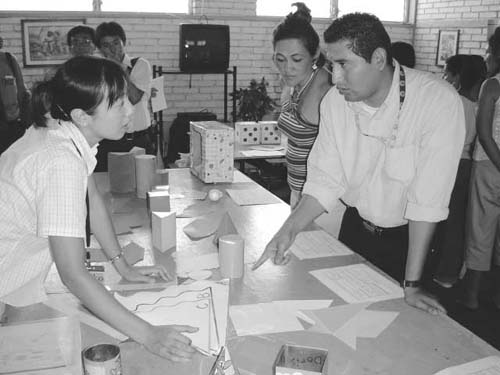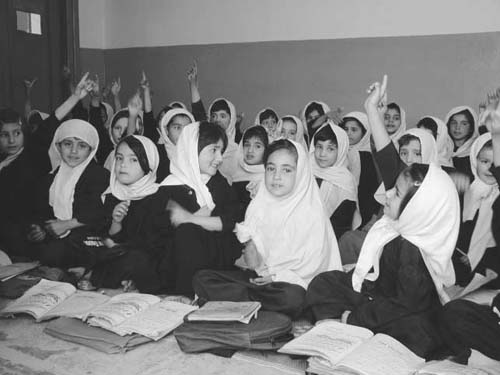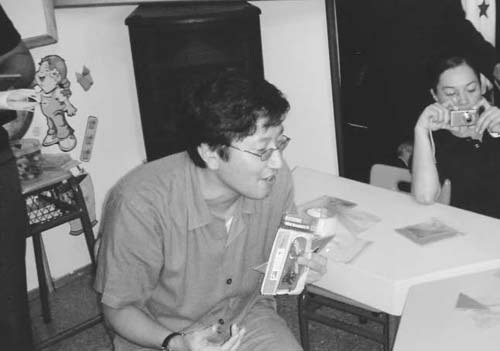Japan's Official Development Assistance White Paper 2006
Main Text > Part II ODA DISBURSEMENTS IN FISCAL YEAR 2005 > Chapter 2 Details about Japan's ODA > Section 2. Measures for Each of the Priority Issues > 1. Poverty Reduction > (1) Education
(1) Education
Education provides the human resources needed for social and economic development, and also contributes to poverty reduction through improving the capacity of individual people to make a living. In addition, when they fully develop their own abilities and capacities through education, and participate in various political, economic, and social activities, their life choices widen allowing them to lead their lives with dignity.
However, throughout the world there are currently over 100 million children who, for a variety of reasons, are unable to receive education. One fifth of the world's adult population, or roughly 770 million people, are illiterate, and roughly two thirds of them are women.
To improve this situation, since 1990 the international community has been working toward the realization of Education for All (EFA),*2 which provides everyone with access to basic education.
In addition, the Education for All (EFA)-Dakar Framework for Action was established in 2000. Items in the Dakar Framework for Action, such as achieving universal primary education and gender parity in education by 2015, were also incorporated into the MDGs. Japan proactively provides support toward the achievement of the Dakar Framework for Action not only by bilateral assistance but also by multilateral cooperation through United Nations Educational, Scientific and Cultural Organization (UNESCO) and others.5
Japan has traditionally worked toward educational support with a focus on "nation building" and "human capacity development." In 2002, Japan declared it would provide more than ¥250 billion of ODA in the field of education for low-income countries over the coming five years. By the end of FY2004, Japan had disbursed approximately ¥156.2 billion through grant aid, technical cooperation and the trust funds, which were established in UNESCO and other international organizations. Furthermore, in 2002 Japan announced the Basic Education for Growth Initiative (BEGIN) to support the realization of Education for All. This initiative sets as its priority areas ensuring "access," improving "quality," and enhancing "management" of education. BEGIN also includes educational support for nation building in post-conflict countries as a new aid area to support the efforts toward the achievement of Education for All in developing countries.
< Support for Basic Education Based on BEGIN >
A. Ensuring "Access" to Basic Education
As part of its efforts to ensure "access," Japan is making efforts in terms of both hardware, such as the construction of school facilities; and software, such as awareness-raising activities for parents and local residents. As an example of support for hardware aspects, in FY2005 Japan assisted Nepal for the Project for Construction of Primary Schools in support of Education for All. Education is a crucial instrument in realizing sustainable economic growth, and school enrollment is expected to increase as a result of this project. As a particular measure, Japan newly established its Grant Aid for Community Empowerment in FY2006. It is anticipated that this financing scheme will bring substantial cost reductions and increase the amount of construction by actively using local contractors in the design and construction stages upon local specification. Japan installs the toilets for boys and girls separately in schools to establish an environment where girls can be at ease in attending school. As an example of efforts regarding software aspects, Japan is implementing the Community-Based Basic Education Improvement Project with the objective of increasing access to primary education in rural areas of Ethiopia. This project conducts activities in the Oromia Region, which is one of the rural areas of Ethiopia, like upgrading information on education to accurately grasp the educational needs of the region, supporting the construction of primary schools by local residents utilizing means for resident participation, supporting the management of a school administration board, and capacity development for regional education administrative officials. Through these activities the project supports creating a model for ensuring access to primary education through the cooperation of residents and administration in rural areas.
To realize "Education for All" access to education must also be provided to illiterates, which account for about one fifth of the world's adult population. Since FY2004 Japan has been implementing the Punjab Literacy Promotion Project (PLPP) with the goal of increasing the literacy rate in Pakistan, a country where nearly half of the overall population is illiterate. This project has been consistently supporting the development of a literacy database and the formulation and implementation of a literacy education project which incorporates informal education, project monitoring, and project evaluations. Moreover, the support for informal education aimed at people not receiving a formal education at school which comprises a part of PLPP is an effective means of providing the education necessary for illiterate people.
B. Raising the "Quality" of Basic Education
In addition to the issue of access to education, many developing countries also face the challenge of improving the "quality" of education. The insufficient quality of education in developing countries has resulted in the fact that there are people who have graduated from primary school, but are unable to read, write or do simple calculations, and there are high repetition and drop-out rates. As for primary causes for the low quality of education, significant problems exist such as shortages of text books and educational materials, underdeveloped curriculums, as well as a shortage of trained teachers. With this in mind, Japan has supported teacher training in 26 countries worldwide for raising the "quality" of education, with mathematics and science education placed as a priority area. Mathematics and science serve as the foundation for each and every person to live within their society, while being important for these countries to accomplish technological and scientific advancements and economic and social development. Teachers improve lessons in a concrete manner through teacher training for conducting practical lessons, allowing children and students to better understand the lessons and derive pleasure from learning. Furthermore, in order to make this effort a sustainable one, Japan is providing support combining a diverse array of efforts. These efforts include creating teachers' manuals, institutionalizing systems for teacher training, improving school management and administration, and improving curriculums and text books.

Learning tools created by members of Japan Overseas Cooperation Volunteers
C. Improving the "Management" of Basic Education
For the "management" of education, Japan provides support for formulating educational policies and plans and improving the management capabilities for schools and local administration of education. Niger is a country where the enrollment rate of primary education is at the worst level worldwide, and whose education sector plan has been endorsed by the Fast Track Initiative (FTI).*1 Since 2004 Japan has been supporting a participatory school management by strengthening the functions of school management communities, which consist of teachers, guardians, and local residents, and also by developing the capacity of local administrative officials of education in Niger. Remarkable results have already been achieved at most of the schools in the targeted areas, as exemplified by the case in which the residents voluntarily developed and implemented activities to improve the schools.
D. Supporting Education for Post-Conflict Nation Building
Education not only provides a foundation for post-conflict reconstruction, but also plays a facilitating role in promoting mutual understanding, serving as a cornerstone for peace, and protecting children from various dangers. Japan has been extending assistance in post-conflict education rehabilitation efforts in cooperation with international organizations and NGOs. From among these, Japan has been strengthening collaboration with the United Nations Children's Fund (UNICEF) in recent years, especially in implementing the Back to School Campaign in Afghanistan and support for the rehabilitation of primary and secondary education in Iraq. Making the most of this experience, in September 2005 Japan initiated support activities such as building primary schools and providing text books through the Go to School Campaign in southern Sudan. In addition, in February 2006 Japan initiated similar primary education support in Burundi in collaboration with UNICEF as part of initiatives supporting the consolidation of peace in Africa.

Children returning to primary school under the Back to School Campaign in Afghanistan (Photo: UNICEF)
Column II-1 Support for Afghan Women Spread Among the People: Training in Japan for Afghanistan Women Education Leaders
E. Creating the Cooperation Bases System and Utilizing In-Service Teachers
In order to strengthen the domestic institutions for education-related cooperation, the Project for Creating the Cooperation Bases System*1 was launched in April 2003. This system is centered on universities, NGOs, and similar institutions, whose efforts are joined to carry out activities like organizing and amassing Japan's knowledge regarding education and its experience in educational cooperation. In addition, under this system they also create educational cooperation models which can be used by the parties involved in assistance from inside and out of the country, among other efforts.
As part of the Cooperation Bases System project, Japan's Ministry of Education, Culture, Sports, Science and Education (MEXT) and Ministry of Foreign Affairs (MOFA) have co-hosted the Japan Education Forum (JEF) since 2003. At the third forum held in February 2006 speeches were made by the President of Takushoku University and the Chief Director of the Ministry of Education and Sports of Ghana, followed by a panel discussion with the Deputy Director of the UNESCO International Institute for Educational Planning (IIEP), the Director General for Quality Improvement of Teachers and ministry Education Personnel of the Ministry of National Education of Indonesia, and the Director of the National Institute for Science and Mathematics Education Development (NISMED) of the University of the Philippines. Opinions and views were exchanged regarding improving the quality of the teachers, which is essential to raising the quality of education.
Under the Japan Overseas Cooperation Volunteers (JOCV) Special In-Service Teacher Participation Scheme6 which was established in FY2001, a total of 353 in-service teachers have been dispatched over five years and are actively working in many parts of the world.
< Supporting the South-South Cooperation in the Field of Education >
Japan's support of science, mathematics, and engineering education has now developed into the South-South Cooperation, which consists of support provided via other countries within the region. In Africa, Strengthening of Mathematics and Science in Secondary Education in Western, Eastern, Central and Southern Africa (SMASSE-WECSA) was founded as an intra-regional collaborative network centered on the SMASSE*2 project that Japan has been supporting in Kenya since 1998. SMASSE-WECSA conducts activities to spread an approach of restructuring the lessons for secondary mathematics and science education established by the SMASSE project to other African countries. This approach introduces experiments and practical training, and also promotes the originality and ingenuity of teachers. Additionally, in 2004 Japan joined the Association for the Development of Education in Africa (ADEA).7 Since then Japanese has taken initiative in setting up a working group for mathematics and science. It has also been contributing in communalizing the knowledge and experience of SMASSE-WECSA, as well as in formulating assistance trends for mathematics and science education. In Central and South America, Japan started the Project for the Improvement of Teaching Methods in Mathematics (PROMETAM)*3 in Honduras in 2003. This later became a core of the region-wide cooperation targeting the four intra-region countries of Nicaragua, El Salvador, the Dominican Republic, and Guatemala.8 At the level of higher education as well, Japan is making the most proactive efforts for the South-South Cooperation (including tripartite cooperation) among the donor countries. This is exemplified by the initiation in 2003 of the ASEAN University Network/Southeast Asia Engineering Education Development Network, which links the 10 countries of ASEAN with Japanese universities.

Science and math education by a JICA expert in Honduras (Photo: JICA)
Chart II-11 Japan's Assistance for Science and Mathematics Education in FY2005

<Supporting the Decade of Education for Sustainable Development>
In addition to the efforts for education as mentioned above, at the 2002 World Summit on Sustainable Development (WSSD), Japan proposed the United Nations Decade of Education for Sustainable Development (UNDESD),9 which was adopted at that year's UN General Assembly. Japan contributed US$100,000 for this initiative in March 2004. Starting in January 2005, the initiative was launched with Japan assisting UNESCO, which is the lead agency for promoting UNDESD, in the formulation of the International Implementation Scheme. Furthermore, Japan also set up the UNESCO/Japan Funds-in-Trust for the Promotion of Education for Sustainable Development in FY2005 to assist UNESCO's efforts, including community- and school-based activities and the development of teaching materials related to education for sustainable development. In addition, in June 2006 in Sendai at the Third Dialogue on Environmental Education of the Asia Cooperation Dialogue (ACD), Japan announced its Action Plan for DESD which had been formulated in March 2006. Japan is working to promote the UNDESD through exchanging opinions with Asian countries about each other's efforts.


 Next Page
Next Page